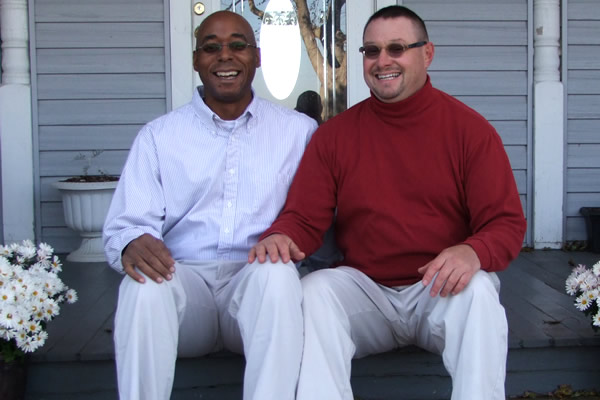National
Md. same-sex marriage law takes effect
Referendum passed in November by a 52-48 percent margin


Tracy Staples and Bob Zuber, co-owners of the Black Walnut Point Inn in Tilghman Island, Md. (Photo courtesy of Stapes and Zuber.)
A number of gay couples immediately took advantage of Maryland’s same-sex marriage law after it took effect at midnight on Tuesday.
Sabrina Pettis, who is a member of the Maryland National Guard, married her fiancée Natasha at an Annapolis church at 12:01 a.m. Ellicott City residents Dale Knight and Jeff Arney tied the knot at a friend’s Howard County home at the same time, while at least four same-sex couples were expected to exchange vows in Cumberland just after midnight.
Long-time Baltimore mayoral aide James Scales and his partner, William Tasker, are among the seven same-sex couples who tied the knot at Baltimore City Hall once the building opened at 12:30 a.m. Mayor Stephanie Rawlings-Blake and Carrie Evans, executive director of Equality Maryland, are among those who attended the weddings.
“New Year’s Day will have a new meaning for the hundreds — if not thousands — of couples who will finally have the right to marry the person they love,” Rawlings-Blake said. “It is a remarkable achievement for Maryland, and we are excited to open City Hall to host some of the first wedding ceremonies in our great state. Newly married couples will stand before their friends and family to profess their love and commitment to each other. This is what we worked for, and I am looking forward to take part in this historic and jubilant day.”
More than a dozen same-sex couples are also expected to marry at the gay-owned Black Walnut Point Inn on Tilghman Island in Talbot County on Tuesday.
“Tomorrow morning most Marylanders will wake up and go about their regular day — getting kids dressed, cleaning the house, running errands,” Evans told the Washington Blade on Monday. “However, for thousands of LGBT Marylanders they will wake up with the ability to marry the person they love. What a great way to start 2013.”
Maryland is one of nine states and D.C. that allow gays and lesbians to legally marry.
Voters in November backed a referendum in support of the state’s same-sex marriage law that Gov. Martin O’Malley signed earlier in 2012 by a 52-48 percent margin. Similar ballot measures also passed in Maine and Washington, while Minnesota voters struck down a proposed state constitutional amendment that would have defined marriage as between a man and a woman.
Lawmakers in Delaware, Hawaii, Illinois, Rhode Island and other states are expected to consider bills in the coming year that would allow same-sex marriage.
“Our engagement began in Maryland a year and a half ago — first in helping get the bill through the legislature and then securing the decisive win on Election Day,” Kevin Nix, spokesperson for the Human Rights Campaign, said on Monday afternoon. “The sheer joy we’ll see on people’s faces tomorrow —both of those married and of their family and friends — is priceless. Looking ahead, the Maryland victory provides real momentum for the next round of states to secure marriage in 2013 and we’re looking forward to fairness, freedom, and family prevailing yet again.”
New York
Two teens shot steps from Stonewall Inn after NYC Pride parade
One of the victims remains in critical condition

On Sunday night, following the annual NYC Pride March, two girls were shot in Sheridan Square, feet away from the historic Stonewall Inn.
According to an NYPD report, the two girls, aged 16 and 17, were shot around 10:15 p.m. as Pride festivities began to wind down. The 16-year-old was struck in the head and, according to police sources, is said to be in critical condition, while the 17-year-old was said to be in stable condition.
The Washington Blade confirmed with the NYPD the details from the police reports and learned no arrests had been made as of noon Monday.
The shooting took place in the Greenwich Village neighborhood of Manhattan, mere feet away from the most famous gay bar in the city — if not the world — the Stonewall Inn. Earlier that day, hundreds of thousands of people marched down Christopher Street to celebrate 55 years of LGBTQ people standing up for their rights.
In June 1969, after police raided the Stonewall Inn, members of the LGBTQ community pushed back, sparking what became known as the Stonewall riots. Over the course of two days, LGBTQ New Yorkers protested the discriminatory policing of queer spaces across the city and mobilized to speak out — and throw bottles if need be — at officers attempting to suppress their existence.
The following year, LGBTQ people returned to the Stonewall Inn and marched through the same streets where queer New Yorkers had been arrested, marking the first “Gay Pride March” in history and declaring that LGBTQ people were not going anywhere.
New York State Assemblywoman Deborah Glick, whose district includes Greenwich Village, took to social media to comment on the shooting.
“After decades of peaceful Pride celebrations — this year gun fire and two people shot near the Stonewall Inn is a reminder that gun violence is everywhere,” the lesbian lawmaker said on X. “Guns are a problem despite the NRA BS.”
New York
Zohran Mamdani participates in NYC Pride parade
Mayoral candidate has detailed LGBTQ rights platform

Zohran Mamdani, the candidate for mayor of New York City who pulled a surprise victory in the primary contest last week, walked in the city’s Pride parade on Sunday.
The Democratic Socialist and New York State Assembly member published photos on social media with New York Attorney General Letitia James, telling followers it was “a joy to march in NYC Pride with the people’s champ” and to “see so many friends on this gorgeous day.”
“Happy Pride NYC,” he wrote, adding a rainbow emoji.
Mamdani’s platform includes a detailed plan for LGBTQ people who “across the United States are facing an increasingly hostile political environment.”
His campaign website explains: “New York City must be a refuge for LGBTQIA+ people, but private institutions in our own city have already started capitulating to Trump’s assault on trans rights.
“Meanwhile, the cost of living crisis confronting working class people across the city hits the LGBTQIA+ community particularly hard, with higher rates of unemployment and homelessness than the rest of the city.”
“The Mamdani administration will protect LGBTQIA+ New Yorkers by expanding and protecting gender-affirming care citywide, making NYC an LGBTQIA+ sanctuary city, and creating the Office of LGBTQIA+ Affairs.”
U.S. Supreme Court
Supreme Court upholds ACA rule that makes PrEP, other preventative care free
Liberal justices joined three conservatives in majority opinion

The U.S. Supreme Court on Friday upheld a portion of the Affordable Care Act requiring private health insurers to cover the cost of preventative care including PrEP, which significantly reduces the risk of transmitting HIV.
Conservative Justice Brett Kavanaugh authored the majority opinion in the case, Kennedy v. Braidwood Management. He was joined by two conservatives, Chief Justice John Roberts and Justice Amy Coney Barrett, along with the three liberal justices, Sonia Sotomayor, Elena Kagan, and Ketanji Brown-Jackson.
The court’s decision rejected the plaintiffs’ challenge to the Affordable Care Act’s reliance on the U.S. Preventative Services Task Force to “unilaterally” determine which types of care and services must be covered by payors without cost-sharing.
An independent all-volunteer panel of nationally recognized experts in prevention and primary care, the 16 task force members are selected by the secretary of the U.S. Department of Health and Human Services to serve four-year terms.
They are responsible for evaluating the efficacy of counseling, screenings for diseases like cancer and diabetes, and preventative medicines — like Truvada for PrEP, drugs to reduce heart disease and strokes, and eye ointment for newborns to prevent infections.
Parties bringing the challenge objected especially to the mandatory coverage of PrEP, with some arguing the drugs would “encourage and facilitate homosexual behavior” against their religious beliefs.
-

 U.S. Supreme Court4 days ago
U.S. Supreme Court4 days agoSupreme Court upholds ACA rule that makes PrEP, other preventative care free
-

 U.S. Supreme Court4 days ago
U.S. Supreme Court4 days agoSupreme Court rules parents must have option to opt children out of LGBTQ-specific lessons
-

 District of Columbia5 days ago
District of Columbia5 days agoMan sentenced to 15 years in prison for drug deal that killed two DC gay men
-

 Federal Government5 days ago
Federal Government5 days agoWhite House finds Calif. violated Title IX by allowing trans athletes in school sports










